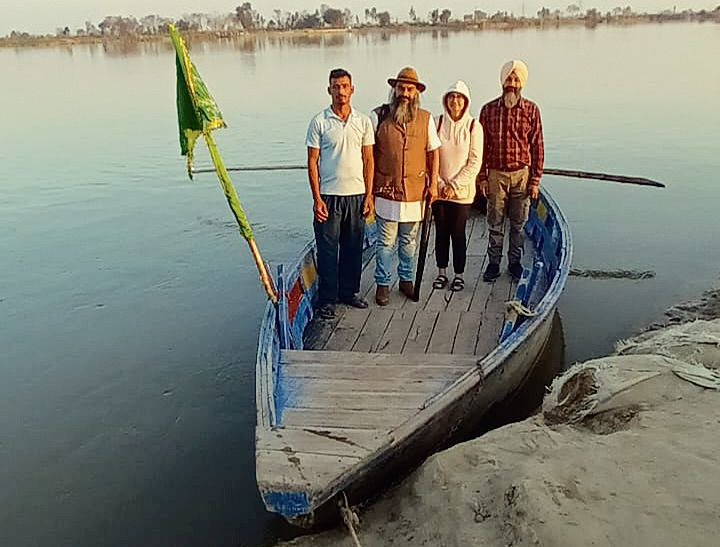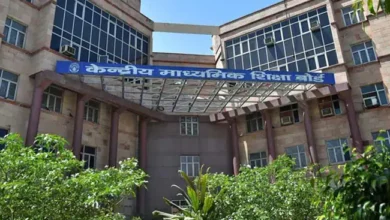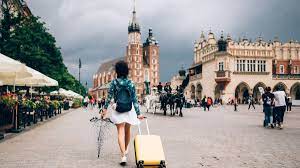Tarn Taran Diary: Transitioning from a physician to a Dhrupad master
Dr. Sunny Sandhu, who was born and raised in Tarn Taran, now resides in France and uses Dhrupad to provide music therapy classes. He was the first from Tarn Taran to attend India’s top medical school, the All India Institute of Medical Sciences (AIIMS), in New Delhi. His experience with Dhrupad began when he attended a performance with Ustad Asad Ali Khan performing on the Rudra Veena in 2016 when he was a student at AIIMS.

He often travels to Tarn Taran, and on a recent journey, he revealed that the Dhrupad song “Allah Tero Naam Tarn Taran,” performed by the Pakistani Talwandi brothers, has the first mention of Tarn Taran. He claims that Dhrupad is a traditional Indian music style that peaked during the reign of Maharaja Ranjit Singh.
This kind of music has suffered tremendously from colonization and the subsequent partition. These days, it is hard to locate Dhrupad practitioners. This kind of art is spiritual in character, and both practitioners and listeners benefit from it. According to Dr. Sunny Sandhu, communication between man and the environment is vital. He expressed his gratitude to Ustad Asad Ali Khan for accepting him as a student. He was reunited with nature and his origins via Dhrupad. In order for him to learn Dhrupad correctly, Ustadji advised him to spend some time beside rivers when he first began studying it.
Thus, he traveled to Tarn Taran and spent some time along the Beas River. At that point, he learned that Beas is home to river dolphins. When he realized what his life’s work was, he was on the beda (large boat) with the boatmen at Karmuwala village (beas riverbank), gazing at this incredible animal. He needed to prevent the disappearance of both the dolphin and the boatmen. In 2011, he began bringing schools to observe river dolphins and learn about the local cultural traditions. He began developing the Dhrupad-based Bhoomitra Beda Yatra program, which focuses on environmental education. “Bulanaji” is a song that Dr. Sandhu created just for the river dolphins.
He also rediscovered Tarn Taran’s ancient heritage. “We have gorgeous sarais like Sarai Amanat Khan, Fatehabad, etc., and we are on the historic Grand Trunk Road. But few individuals were aware of this, said Dr. Sunny. “These treasures must be preserved and passed on to the next generation. Every year on February 2, World Wetland Day, he organizes the Bhoomitra Beda Yatra, he explains. Rabbi Shergill took part in the event last year. This year’s first international festival near the river Beas, Tarn Taran, included participation from Niccolo Vacchi, a French saxophonist and Dhrupad practitioner.
Another partner was the Indian Trust for Art and Cultural Heritage. He is working hard to preserve Punjab’s cultural legacy via INTACH and hopes to establish a branch in Tarn Taran to aid in the preservation of the region’s ecology, culture, and artwork. According to him, Harike has Asia’s biggest wetland, where dolphins may be seen in the river. Although the Old Grand Trunk Road exists, hardly much is known about it, and there isn’t much effort put into developing sustainable tourism.
Kisan Sabha begs DC to refrain from enforcing the firearms deposit legislation.
Elections to the Lok Sabha will soon take place. As part of the first round of preparations, the government has directed licensed gun owners to leave their guns with the police or arms dealers in order to preserve peace and order. If someone breaks the regulation, they will be prosecuted under the applicable CrPC provisions.
In light of the reported terrible state of law and order in the area, a farmers’ organization called Jamhoori Kisan Sabha recently sent a note to the Tarn Taran Deputy Commissioner, who also serves as the district election officer, pleading with the government not to impose the requirement.
When there were even more illegal firearms in the region, Daljit Singh Dialpur and other organization leaders informed the Deputy Commissioner that 20,000 people had been granted permits for self-defense. The farmers’ organization informed the DC that theft, looting, kidnapping, and extortion are commonplace crimes and that farmers who live in farm homes far from the communities’ populous areas would not feel safe if they were forced to turn up their firearms.
According to the Sabha, this would give antisocial groups with illicit firearms a free hand to do whatever they pleased with the unarmed populace. The farmers’ organization has pleaded with the government to refrain from compelling law-abiding citizens to surrender their firearms, which they retain for self-defense against armed, antisocial forces. The Jamhoori Kisan Sabha’s idea needs careful consideration by the district government.







